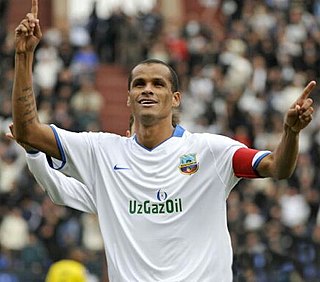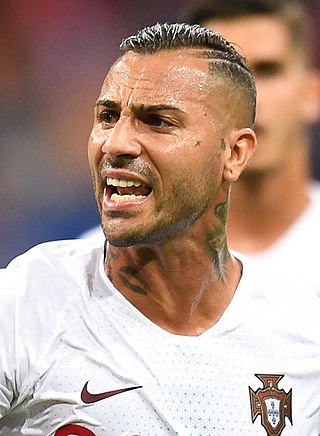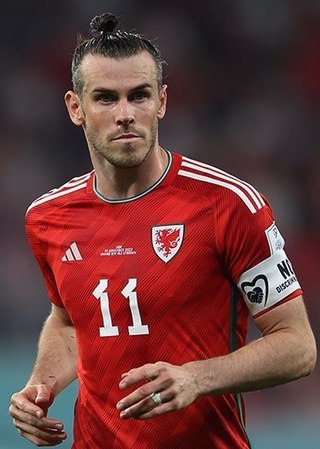A drop kick is a type of kick in various codes of football. It involves a player intentionally dropping the ball and then kicking it either 'as it rises from the first bounce' (rugby) or 'as, or immediately after, it touches the ground'.

A knuckleball or knuckler is a baseball pitch thrown to minimize the spin of the ball in flight, causing an erratic, unpredictable motion. The air flow over a seam of the ball causes the ball to change from laminar to turbulent flow. This change adds a deflecting force to the baseball, making it difficult for batters to hit but also difficult for pitchers to control and catchers to catch; umpires are challenged as well, as the ball's irregular motion through the air makes it harder to call balls and strikes. A pitcher who throws knuckleballs is known as a knuckleballer.

Rivaldo Vítor Borba Ferreira, known simply as Rivaldo, is a Brazilian former footballer who played mainly as an attacking midfielder but also as a second striker, and on occasion deployed as a wide midfielder or as a winger. Rivaldo is regarded as one of the greatest, most skillful, and most creative players of all time. He was renowned for his bending free kicks, bicycle kicks, feints, powerful ball striking from distance, and ability to both score and create goals. In 1999, he won the Ballon d'Or and was named FIFA World Player of the Year. In 2004, he was named by Pelé in the FIFA 100 list of the world's greatest living players. With success at club and international level, he is one of nine players to have won the FIFA World Cup, the UEFA Champions League and the Ballon d'Or.

Ronaldo de Assis Moreira, commonly known as Ronaldinho Gaúcho or simply Ronaldinho, is a Brazilian former professional footballer who played as an attacking midfielder or winger. Widely regarded as one of the greatest players of all time, he won two FIFA World Player of the Year awards and a Ballon d'Or. He is the only player ever to have won a World Cup, a Copa América, a Confederations Cup, a Champions League, a Copa Libertadores and a Ballon d'Or. A global icon of the sport, Ronaldinho was renowned for his technical skills, creativity, dribbling ability and accuracy from free-kicks, his use of tricks, feints, no-look passes and overhead kicks, as well as his ability to score and create goals, all prominent characteristics of his early-age background playing futsal. He is known by the nickname "O Bruxo".

Giuseppe Meazza was an Italian football manager and player. Throughout his career, he played mainly for Inter Milan in the 1930s, scoring 242 goals in 365 games for the club, and winning three Serie A titles, as well as the Coppa Italia; he later also played for local rivals Milan, as well as Turin rivals Juventus, in addition to his spells with Varese and Atalanta. At the international level, he led Italy to win two consecutive World Cups: in 1934 on home soil, and in 1938 as captain, being named to the All-star Team.

Cristiano Ronaldo dos Santos Aveiro is a Portuguese professional footballer who plays as a forward for and captains both Saudi Pro League club Al Nassr and the Portugal national team. Widely regarded as one of the greatest players of all time, Ronaldo has won five Ballon d'Or awards, a record three UEFA Men's Player of the Year Awards, and four European Golden Shoes, the most by a European player. He has won 33 trophies in his career, including seven league titles, five UEFA Champions Leagues, the UEFA European Championship and the UEFA Nations League. Ronaldo holds the records for most appearances (183), goals (140) and assists (42) in the Champions League, goals in the European Championship (14), international goals (128) and international appearances (206). He is one of the few players to have made over 1,200 professional career appearances, the most by an outfield player, and has scored over 880 official senior career goals for club and country, making him the top goalscorer of all time.

Ricardo Andrade Quaresma Bernardo is a Portuguese former professional footballer who played as a winger.

In association football, a bicycle kick, also known as an overhead kick or scissors kick, is an acrobatic strike where a player kicks an airborne ball rearward in midair. It is achieved by throwing the body backward up into the air and, before descending to the ground, making a shearing movement with the legs to get the ball-striking leg in front of the other. In most languages, the manoeuvre is named after either the cycling motion or the scissor motion that it resembles. Its complexity, and uncommon performance in competitive football matches, makes it one of association football's most celebrated skills.

Andrea Pirlo is an Italian football manager and former player who is currently the head coach of Serie B club Sampdoria. Considered one of the greatest midfielders of all-time, Pirlo was renowned for his vision, ball control, technique, creativity, passing, and free kick ability.
In sports, dribbling is maneuvering a ball by one player while moving in a given direction, avoiding defenders' attempts to intercept the ball. A successful dribble will bring the ball past defenders legally and create opportunities to score.

Antônio Augusto Ribeiro Reis Júnior, commonly known as Juninho Pernambucano or simply Juninho, is a Brazilian former professional footballer who was most recently the sporting director of French club Lyon. A dead-ball specialist noted for his bending free kicks, in particular the knuckleball technique which he developed, Juninho holds the record for the highest number of goals scored through free kicks and is considered by many to be the greatest free-kick taker of all time.

Gareth Frank Bale is a Welsh former professional footballer who played as a winger, most notably for Tottenham Hotspur, Real Madrid and Wales. He is widely regarded as one of the best footballers of his generation and one of the greatest Welsh players of all time. He was best known for his explosive pace, athleticism, and powerful strikes from distance.

In association football, shooting is hitting the ball in an attempt to score a goal. It is usually done using the feet or head. A shot on target or shot on goal is a shot that enters the goal or would have entered the goal if it had not been blocked by the goalkeeper or another defensive player.

Waldyr Pereira, also known as Didi, was a Brazilian footballer who played as a midfielder or as a forward. He played in three FIFA World Cups, winning the latter two.

The 2014 Copa del Rey final was the 112th final of Spain's premier football cup since its establishment. The match was an El Clásico between Real Madrid and Barcelona on 15 April 2014 at Mestalla in Valencia, making it the seventh such Copa del Rey final.
In association football, the panenka is a technique used while taking a penalty kick in which the taker, instead of kicking the ball to the left or right of the goalkeeper, gives a light touch underneath the ball, causing it to rise and fall within the centre of the goal, deceiving the goalkeeper who most likely will have committed to a dive away from the centre.

The UEFA Euro 2016 Final was the final match of Euro 2016, the fifteenth edition of the European Football Championship, UEFA's quadrennial competition for national football teams. The match was played at the Stade de France in Paris, France, on 10 July 2016, and was contested by Portugal and France. The 24-team tournament began with a group stage, from which 16 teams qualified for the knockout phase. En route to the final, Portugal finished third in Group F, with draws against Iceland, Austria and Hungary. Portugal then defeated Croatia in the last 16 before beating Poland in the quarter-final after a penalty shoot-out. They progressed to the final after beating Wales in the semi-final. France finished the group stage as winners of Group A, beating Romania and Albania before drawing with Switzerland. In the knockout rounds, France defeated the Republic of Ireland and Iceland before beating Germany in the semi-final.
The following article outlines statistics for UEFA Euro 2016, which took place in France from 10 June to 10 July 2016. Goals scored during penalty shoot-outs are not counted, and matches decided by a penalty shoot-out are considered draws.

Group B of the 2018 FIFA World Cup took place from 15 to 25 June 2018. The group consisted of Portugal, Spain, Morocco, and Iran. The top two teams, Spain and Portugal, advanced to the round of 16.

A free kick is a method of restarting play in association football. It is awarded after an infringement of the laws by the opposing team.


















